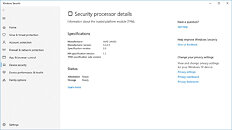- Joined
- Oct 9, 2007
- Messages
- 47,579 (7.46/day)
- Location
- Dublin, Ireland
| System Name | RBMK-1000 |
|---|---|
| Processor | AMD Ryzen 7 5700G |
| Motherboard | ASUS ROG Strix B450-E Gaming |
| Cooling | DeepCool Gammax L240 V2 |
| Memory | 2x 8GB G.Skill Sniper X |
| Video Card(s) | Palit GeForce RTX 2080 SUPER GameRock |
| Storage | Western Digital Black NVMe 512GB |
| Display(s) | BenQ 1440p 60 Hz 27-inch |
| Case | Corsair Carbide 100R |
| Audio Device(s) | ASUS SupremeFX S1220A |
| Power Supply | Cooler Master MWE Gold 650W |
| Mouse | ASUS ROG Strix Impact |
| Keyboard | Gamdias Hermes E2 |
| Software | Windows 11 Pro |
In more reason why Microsoft's requirement for hardware trusted platform modules for its upcoming Windows 11 operating system is arbitrary, the company revealed that it is willing to tweak the hardware TPM system requirements to accommodate platforms from 2017, which include the very first generation of AMD "Zen" (Ryzen 1000 series), and Intel 7th Gen Core "Kaby Lake." In a Windows Insider blog posted dated June 28, Microsoft explained in brief why Windows 11 needs TPM 2.0 hardware, and that the "PC Health Check App," the software tool Microsoft is giving users to check whether their PCs measure up to Windows 11, has been temporarily removed from the website while they work on getting its accuracy right.

In the blog, Microsoft explains that a hardware TPM is required for secure credentials storage, to drive features such as device encryption, Windows Hello biometrics, virtualization-based security (VBS), and hypervisor-protected code integrity (HVCI) and Secure Boot. Most modern processors include a TPM 2.0-compliant on-die TPM, some even have features such as VBS and whole-memory encryption.
View at TechPowerUp Main Site
"The intention of today's post is to acknowledge and clarify the confusion caused by our PC Health Check tool, share more details as to why we updated the system requirements for Windows 11 and set the path for how we will learn and adjust. Below you will find changes we are making based on that feedback, including ensuring we have the ability for Windows Insiders to install Windows 11 on 7th generation processors to give us more data about performance and security, updating our PC Health check app to provide more clarity, and committing to more technical detail on the principles behind our decisions. With Windows 11, we are focused on increasing security, improving reliability, and ensuring compatibility. This is what drives our decisions.

In the blog, Microsoft explains that a hardware TPM is required for secure credentials storage, to drive features such as device encryption, Windows Hello biometrics, virtualization-based security (VBS), and hypervisor-protected code integrity (HVCI) and Secure Boot. Most modern processors include a TPM 2.0-compliant on-die TPM, some even have features such as VBS and whole-memory encryption.
View at TechPowerUp Main Site





 , ohh maybe I wont have to upgrade to 11!
, ohh maybe I wont have to upgrade to 11!